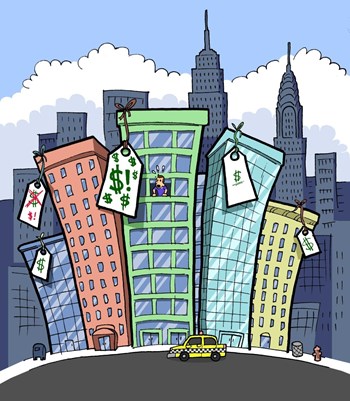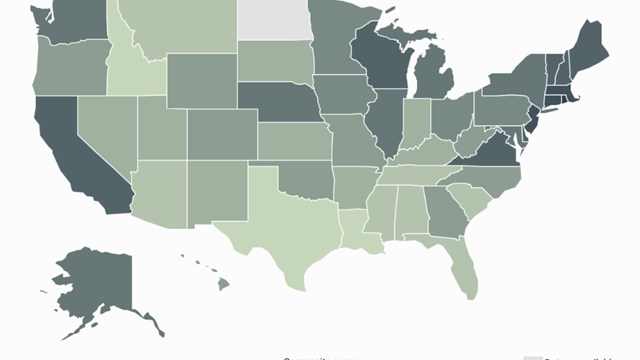
On September 15, 2008, Lehman Brothers investment bank went under in the largest bankruptcy of all time. The economy was already on the decline, other august companies had already foundered, and both presidential candidates were proclaiming the situation as the worst economic crisis to face the U.S. since the Great Depression.
The Lehman collapse was, among other things, the first death knell for the Manhattan real estate bull market. Thousands of potential buyers found themselves suddenly unemployed, and thousands of apartment owners became reluctant sellers.
In 2009, the real estate market will begin the slow process of surveying and adapting to the new landscape. No one expects it to be a big year for sales, but there remains a cautious optimism in the industry. There is a new president and a new consensus that bold and swift action must be taken to right the economic ship. And there is the widely held view that this is still New York City, and what is true for the real estate markets in the rest of the country has little or no truth here.
Buyers Are Out For Blood…
Time was, if you found an apartment you liked in Manhattan, you had to submit an offer immediately—usually at well above the asking price—to snag the deal. And if you borrowed money, your interest rate might be seven or eight percent.
Those days are gone—at least for the foreseeable future. The market is almost upside down from what it was just five years ago. Interest rates are low, but the inventory is high.
“As a buyer, you have a unique opportunity in the marketplace,” says Jacky Teplitzky, managing director with Prudential Douglas Elliman. “Incredibly low interest rates, and 40 percent more inventory in the market than a year ago.”
The glut of available properties affords buyers the chance to be picky.
“There’s no urgency on the part of the buyer,” says Paul Purcell, a founding partner with Charles Rutenberg Realty. “They know they have time. They know they have choices.”
They also know what they hear: the economy is bad, it will get worse before it gets better, and the buyers hold all the trump cards.
“It very much depends on who you talk to,” says Harriet Kaufman, an executive managing director with Warburg Realty. “If you talk to a buyer who wants to get a bottom-out deal, it’s going to get worse, it’s going to be a bloodbath.”
No one wants to miss out on what could be the steal of a lifetime. “I think right now, the buyer doesn’t want to be the last fool to pay high,” Teplitzky says.
The current climate is like a game of chicken between buyer and seller. They seller asks for two million dollars. The buyer offers one million. Both are waiting for the other guy to blink. While they wait, not much happens. The high inventory, coupled with the low sales volume, make it difficult for brokers to get a bead on the market.
“The volume is off by about 75 percent, meaning number of sales,” says Purcell. “It’s hard to get a fix on things when you don’t have pricing perspective.”
Another trend: multiple bidding. A buyer might look at six apartments listed at half a million dollars, and make a truly low-ball offer on all six, just to gauge a seller’s sense of desperation.
“Sellers have a lot of decisions to make,” Teplitzky says. “Sellers who don’t need to sell will take the apartment off the market. Those who can rent will rent, to make some money.”
But for the ones who have no recourse but to sell—all they can do is wait. “If they bought five years ago, they should be OK,” Teplitzky says. “Somebody who bought two years ago will definitely lose money.”
Selling in a buyer’s market is really an exercise in expectation management—and that’s part of the broker’s job in this climate. “You have to be realistic,” says Kaufman. “We will make deals. Not at last year’s prices, but we will make deals.”
…But They Are Out There…
Teplitzky, Kaufman, and Purcell agree that there are plenty of buyers out there. There just aren’t enough buyers making legitimate offers to get the engine running.
“Buyers are timid to pull the trigger,” Purcell says, “but there are a lot of them in the market.” He expects sales to pick up during the year. “I watch open houses. I see how busy I am. I sense that people will have the courage to step forward and do something.”
Buyers are waiting for prices to fall—and well they should. A recent report by Goldman Sachs on the Manhattan real estate market concluded that prices were inflated 19 to 44 percent. Will they drop that much? No one knows, but it’s safe to say that the days of flipping a condo for a quick profit have gone the way of the dodo.
Purcell, for one, views this development in a glass-half-full kind of way. “I don’t think any of this is bad,” he says. “I think it’s painful, but I don’t think it’s bad.”
Escalating apartment prices over the last few years have effectively barred most of humanity from owning a place in Manhattan. And this lack of diversity—even if it’s only economic diversity—has its price. Furthermore, most of the apartments in Manhattan are not to be confused with, say, beachfront property in the Hamptons, where topography is of paramount importance.
“I know we’re on the island of Manhattan and the membership fee is expensive,” he says, “but these are boxes in the sky.”
And the boxes in the sky are, for the moment, overpriced.
“Everybody has to realize, we’re going back to pricing in 2005, 2006,” says Teplitzky. “The sooner everybody does that, the better off we’ll be. We’ll get out of this freeze, in which nothing is happening.”
Not all sectors of the market are in the doldrums. Apartments that cost less than a million dollars are still moving, mostly because the people that are buying them—first-time homeowners—were never dependent on Wall Street bonuses, and thus not as affected by the sluggish economy.
When the prices go into the seven figures, however, many first-time buyers are priced out. They don’t have sufficient savings to plop twenty percent or more down, as required by most co-ops, which limits the number of places they could purchase. “It’s a huge problem, the one to two million dollar apartments,” Teplitzky says.
Another group that is more active than others is what Teplitzky calls “the upgraders”—people who now live in two-bedroom units but want three. “Three bedrooms are coming down drastically in price,” she says. “It’s a unique opportunity for upgrading.”
New York is Still New York
The mood of the market is far from euphoric. But real estate brokers tend to be among the bulliest of the bullish, and this slowdown has not dampened a cautious optimism. All told, 2009 may not be a banner year, but if all goes well, it could make 2010 better.
“Best case scenario is, if we get rid of some of the inventory at reasonably attractive prices,” says Kaufman. “Ten to fifteen percent off the asking price, anything in that range.” And the worst-case scenario? “That we don’t. We can’t get rid of the inventory.”
One thing that will help unload inventory is the precipitous drop-off in new development, Teplitzky says.
Then there is the matter of New York being New York.
“We have elements others don’t have,” Teplitzky says. “Foreign buyers, empty nesters, second homes, pied a terre people. Other areas are affected by families—we’re not so dependent only on that segment.”
Kaufman agrees. “New York is different than the rest of the country. It’s not as dire as in Florida, California, or Long Island, even.”
Still, it’s hard to really know what will happen. There are too many unknown variables. Will there be more government bailouts? Will the existing bailouts free up credit, as was the hope? Will the Obama administration have an immediate impact on something as intangible as a buyer’s desire to buy?
“Apartments are not like stocks,” says Purcell. “They don’t move together in unison on any day, in any month. There are 9,000 different individuals with 9,000 different stories out there. It’s not a commodity—every property is different, every buyer is different.”
“We’re in uncharted water,” he continues. “We know we’re in over our heads, but we don’t know if the bottom is two inches below us, or twenty feet below us.”
Kaufman sums up best the ability of anyone to adequately forecast the year ahead: “I’ve lost my crystal ball.”
Greg Olear, a freelance writer and soon-to-be novelist, is a frequent contributor to The Cooperator.






Leave a Comment